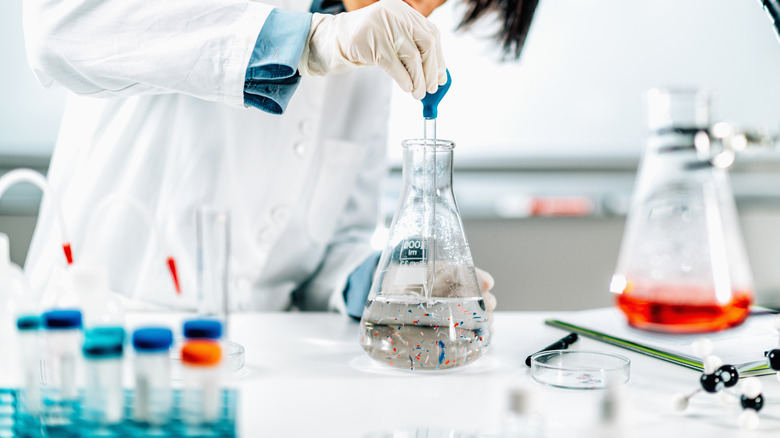Study Reveals Surprising Way Scientists Can Detect Microplastics In Our Bodies
Whether it's the plastic container that keeps your lunch fresh or the water bottle that keeps your drinks cold, the way plastics affect our health has been a cause for concern. We're all familiar with avoiding the use of plastics that pass harmful chemicals into our foods and drinks, but what about avoiding items that cause plastic itself to enter your body? According to MedicalNewsToday, several studies have found evidence of microplastics in human urine and feces, which could impact our health.
According to the National Oceanic and Atmospheric Administration (NOAA), microplastics are tiny pieces of plastic that are less than 5 millimeters long. Microplastics come from a variety of sources like the microbeads found in health and beauty products, as well as larger pieces of plastic that have been degraded. Not only are microplastics affecting aquatic life, but they are impacting human life as well. A 2022 study published in Environment International has helped scientists develop a way to detect microplastics in our bodies.
Scientists detect microplastics in the body through blood filtering
In the study, blood samples were collected from 22 healthy volunteers. Scientists used glass fiber filters to collect plastic particles in the blood that were between 700-500,000 nanometers. The blood samples were tested for plastics used in packaging, textiles, food and drink containers, and plastics used in dentistry and the medical field (via MedicalNewsToday).
Researchers found that polyethylene terephthalate (PET), the plastic that most drink bottles are made of, was detected in more than half of the blood samples. Along with PET, 2 other types of plastic were found in the blood samples. "The fact that just about everyone has microplastic in their blood isn't so surprising when you consider that just about everyone has plastics additives in their bodies," Professor Tamara Galloway, chair of ecotoxicology at the University of Exeter, told Medical News Today. Although a few studies have been published, it is still unclear exactly how microplastics affect our health (via MedicalNewsToday).


